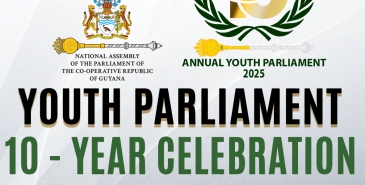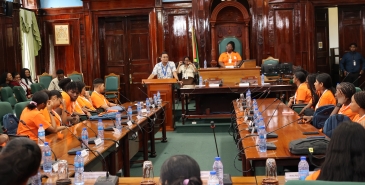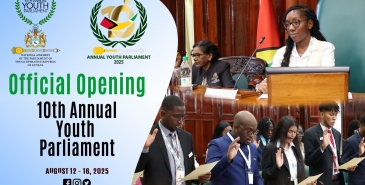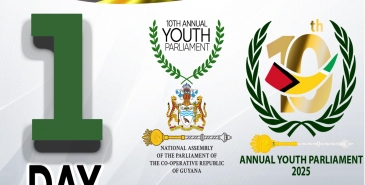Budget 2012
Speech delivered at: 7th Sitting- Tenth Parliament - 10 April, 2012
10 April, 2012
7435
Mr. Trotman: Thank you Mr. Speaker. I want to begin to state my reaction to the Hon. Minister of Finance’s 2012 Budget by adding my voice to those persons who have been lamenting the fact that the National Assembly in 2012, in the new dispensation ushered in by the results of the November 2011 election, with the continued presence of the barricades which are erected around its perimeters every day there is a meeting of the Assembly, has become virtually inaccessible to the public. This situation did not obtain during what we, in the then opposition, often referred to as the worst days of the People’s National Congress (PNC) regime. In that period Mr. Speaker, meetings of the National Assembly were accompanied by the staging of opposition dissent outside of this building on the streets surrounding the Assembly. I was there and took part in a number of those expressions of dissent, unrestrained by the presence of security forces on duty. [Ms. Teixeira: You were lucky.] Because you were not there. I was also privileged to follow the debates in the National Assembly through public address (PA) systems that were strategically placed around the Assembly building. However, since 1992 and throughout the life of the PPP/C Government, which takes tremendous pride in styling itself as the most popular and democratic in the history of this country, the opposite exists. The National Assembly, under the PPP/C regime, has taken on the features of an institution under siege with little or no relationship to the people whose fate it oversees.
I would have thought that after those unique election results, citizens of Guyana would have been enjoying greater freedom to express to Members of the National Assembly and to the world at large, their concerns about issues. The people should not have to visit only an MP’s office in order to speak with that person. They should be allowed, as is done in other countries, to address their representatives as they make their way in and out of Parliament. However, instead of there being greater freedom, what we have, in effect, are greater restraints. The barricades around the Assembly have been extended and very soon may reach as far as Camp Street to the east. Is it that the erection and retention of the barricades is the PPP/C’s response to what it perceives as the revulsion, disdain and contempt which the populace has for it? Is it that they feel a greater sense of security when they see persons whom they believe are opposed to them confined behind those steel barriers?
I recall the days when you had cause to condemn this state of affairs as unacceptable and disruptive. I do not believe the change in your status will force you to conclude otherwise today. I wish, therefore, to call on you and all Members of this Hon. House - who believe in freedom and subscribe to the tenets that the right to protest and the right to freedom of expression are inextricably linked with the democratic aspirations of the people - to do all within our collective powers to ensure the speedy removal of the barricades which impinge on the fundamental rights of citizens to express themselves on those issues which they believe impact negatively on their lives.
Additionally, I wish to call on you to facilitate the desire of citizens, who congregate on the streets outside to follow the debates, by ordering that PA systems be once again placed at strategic points around the Assembly building for their convenience. One of the legacies of this Tenth Parliament is its recognition that freedom is a cornerstone of democracy. Those of us who subscribe to that should work to make it a reality.
I now wish to turn to the Budget, and I want to begin by saying that I believe the extent to which a government demonstrates its concerns for its most valuable resource – the people of the country – can be gauged by the investments in the social programmes that government makes to uplift their standard of life. The impact of these investments must be seen in most, if not every, aspect of the lives of the people. Where there are shortfalls and serious omissions, the impact of these must be properly assessed to understand the effect they will have on those who are most affected by them.
It is my contention that the Hon. Minister of Finance in his budget presentation to this House on Friday, 30th March, 2012, in spite of the claims he makes, and the numbers he was at pains to present as being indicative of the forward movement in people’s fortunes, in fact, de-recognised the value and importance of people in Guyana, particularly the most vulnerable. The Hon. Minister of Finance’s attempts to convince the public that everything is “hunky-dory”, that the future is rosy, that workers with the increase in the threshold are now poised to enjoy the best times of their lives, failed miserably. The measures which he proposed to impose, particularly those which negatively impact on the lives of the most vulnerable in the society namely, working people, women and children, stand in stark contradiction to this position. Already, with the removal of the electricity subsidy from Region 10 consumers, Government has immediately taken away some of the alleged benefits from the recipients of public assistance and old age pensions, and also the poorly paid workers of that community, with the resultant hardships to follow. Let those of us who reside in other Regions not be deluded into believing it will not happen to us. It will; our turn will also come. Let us be clear on one thing, the Government will find ways and means of ensuring that a very significant part of the so-called benefits from the increases find itself back in the hands of the government coffers.
It is my contention that the Hon. Minister of Finance has failed to justify the retention of the value added tax at current levels, and the miniscule and contemptuous nature of the increases he announced for public assistance and old age pension benefits. Just as importantly, he has failed to give a rationale for the absence of any consideration, in his budget proposal, for wages and salaries increases for public sector workers. When taken together, these acts of the Government make a mockery of their claim that the budget is “people-oriented’.
When one takes into consideration the fact that this Government has committed to paying huge pension benefits - the likes of which have not been seen before in this country - to former President Jagdeo, benefits which would allow him to live out of office in a style that is comparable or even better than when he was in office, the measly increases which the Hon. Minister of Finance has earmarked for our elderly is best described as outrageous and disgusting. The situation gets worse when one does the math. You will see that a pensioner, at the existing figure of $7,500 will be able to accumulate the equivalent of one month of Jagdeo’s pension, at current levels, only after 33 1/3 years. In others words, unless a pensioner lives to the ripe old age of 98 and one third years he or she will never draw that one month of Jagdeo’s pension. It is in that context that I shouted shame when the Hon. Minister made his announcement last Friday. If this is not brutal treatment directed at one of our most vulnerable categories, what is?
And I want to add that the Members over on the other side of the House who proposed the increase are so embarrassed by the amounts, for both public assistance and old age pension beneficiaries, that they attempt to hide their embarrassment and argue justification by referring to it in their propaganda campaign in percentage terms rather than in dollar terms. I heard the junior Minister of Finance on one of the Government’s propaganda blitz attempting to rationalise the old age pension benefits as a form of assistance rather than an income. Of course, if he was a man of God he would be close to the flock and hence he would, I believe, have a better understanding of the situation. It is clear that is not the case. His nonsensical position indicates the extent to which he is out of touch with what is going on here in Guyana.
Mr. Speaker: Hon. Member your choice of words such as nonsensical… you are referring to a Member of the House. I once referred to a former President as being myopic and it nearly led to a fight.
Mr. Trotman: Could I say idiotic, Mr. Speaker?
Mr. Speaker: No, that is worse. No. Mr. Trotman. Find a better word than nonsensical and let us go on.
Mr. Trotman: His position only indicates the extent to which he is out of touch with what is going on here in Guyana.
While it may be true that old age pensions were not intended as an income to recipients, it is very true that for a large number of persons the only monetary source they have is what is derived as old age benefits. I want, therefore, to challenge the Hon. Minister of Finance to immediately review the figures and to propose realistic increases in keeping with the rise in the cost of living in Guyana, and the persistent weaknesses in the country’s social safety net. In fact, the target for old age pension should, I believe, be at least half of the minimum wage, which is a reasonable benchmark. Right now all the Minister of Finance seems to be doing is simply plucking figures like rabbits out of a hat.
I believe that the Hon. Minister of Finance should also review the Value Added Tax (VAT) with the intention of reducing it, thereby relieving the burden of citizens. If the Hon. Minister undertakes to do this he will not he loosing face but rather he will demonstrate to Guyanese that he is capable of correcting mistakes. I believe that if the Government fails to respond to the entreaties of the Opposition on those measures we must reject the budget proposals as unacceptable in their present form.
The shortcomings of the budget do not only indicate that the Government lacks a social conscience; they also indicate that the Government acts with a certain degree of malevolence. Traditional public sector workers are not considered a favoured constituency, and so are not deserving of meaningful salary increases. Bauxite workers and their families did not deliver the votes at the last election and, therefore, are punished with the removal of their electricity subsidy, but the subsidy to the sugar industry was increased. Old age pensioners and public assistance recipients are not clearly identified supporters and so benefits are grudgingly disbursed.
That is why I believe the proposals in this 2012 Budget indicate that the Opposition must join together and offer to defend all workers, and other vulnerable categories, against the onslaughts by Government, until such time as they can defend themselves. I also believe that the Opposition owes it to those who voted for us to use our collective energies in this regard. We cannot and must not fail them at this grave hour.
I also believe that as Government boasts about the growth in GDP, and the fact that Guyana is now better off financially than it has ever been, we must encourage workers to challenge for their piece of the pie. As Government continues to dole out the country’s resources to its lackeys and cronies, we must not be reluctant to encourage workers to exercise their genuine right to collective bargaining and by extension their right to proper wages and salaries, and conditions of work. For my part, I pledge my full and unconditional support to workers engaged in legitimate activity to emancipate themselves, to stand and march with them when necessary, and to assist other vulnerable categories to improve on their conditions of life. I say this unhesitatingly and unreservedly.
I now wish to turn to the situation in the Regions. While I do not propose to speak extensively on this part of the budget, other APNU speakers will deal with this in a more comprehensive fashion. I, however, want to say that I note the continuation of the trend to allocate funds to regions purely along political lines and not in keeping with the needs of the individual regions. Thus regions controlled by the PPP/C are earmarked for large allocations regardless of the size of the population, while those controlled by the opposition parties continue to be discriminated against and are allocated smaller amounts. While this is most disappointing it is not surprising to see this trend continuing even in the new dispensation which the 28th November, 2011 ushered in. This trend underscores the reason why some regions are limited in terms of delivery of service to the people on the ground while others are better funded to do so. You will note I said better funded but not more capable.
I am anticipating that when the Hon. Ministers; Norman Whittaker and Ganga Persaud rise to address this House they will present figures and numbers. Again I ask you to note, Mr. Speaker, I said figures and numbers; figures representing monies given to the individual regions, and the numbers representing the percentage of works done for the last financial year. They will also attempt to regale this Assembly with the argument that the moneys given to the regional administration under the PPP/C tenure far outstrip anything given under the 28 years of the PNC rule. What neither of them will do when they make their contributions is to say if the percentage of completed works that are reported is accurate or if, in fact, it is a misrepresentation of the true picture. To support this position my friend from Region 1, Mr. Richard Alleyne, will present information to this Assembly which will show that in Region 1, in 2010, money which was expended for a road which was supposed to be completed to the tune of $25 million cannot be found. That is an indication of what…
Mr. Speaker: The money or the road? [Ms. Selman: The money and the road.]
Mr. Trotman: What I want to do here is to challenge both Ministers to address with honesty and competence the work of the persons they appoint to control the individual regional administrations. The same Regional Executive Officers I just alluded to are all political appointees, and more often than not are PPP/C party members and supporters. If the Auditor General’s reports are to be taken seriously they have very little or no proven track record of competence. Their individual performance reads like a litany of woes, but, yet they continue to be retained in service. They wield immense powers, and the further they are from the centre the more powerful they become. They enrich themselves at the expense of the people they are supposed to serve and complaints to the Ministers against their behavior fall on deaf ears.
Regions 1, 8 and 9 are real examples of tin gods appointed by the PPP/C raping the resources of the country with impunity. An examination of the situation in Region 8 underscores the gravity of the problem. The RDC meets irregularly, once per quarter. The Hon. Ministers will argue in their response that the cost of holding regular meetings is prohibitive, but I will submit here that the cost to the people, in dollar terms, for not holding regular meetings of the RDC far outstrips the cost of holding those meetings.
One of the primary purposes of those meetings is to monitor the performance of the Regional Administration in respect to the instructions and decisions which the RDCs make. These monitoring exercises are intended to allow the peoples’ representatives to know, among other things, what releases were given to the regional administrations by the Ministry of Finance for a specific period, how those amounts were disbursed, and if the moneys were disbursed in keeping with the approved programmes. They are also intended to provide information on the progress of works, health and education related matters et cetera. However, when these meetings are held quarterly, vital information is withheld from the people’s representative, by the REO, who does his own thing. He is everything in the administration, wearing several hats at the same time. He feels he is accountable to no one and grave problems are unearthed only when the audit takes places. These problems keep occurring year after year, and the REO is neither surcharged nor penalised for the grave anomalies which have been exposed. These matters cannot continue unabated. The same situation also exists in the Ministries where Permanent Secretaries, who are also political hacks, are in place. The answer to this ridiculous state of affairs is to revamp the entire public service rules to allow for the appointment of career public servants to these positions. I doubt whether those on the other side of the House will want to accept this proposal. I say this because I do not believe they have any interest in wanting to see any improvement in the areas of transparency and accountability. But, if by some miracle they do not accept the proposals, and while action is being contemplated, the Accountant General must be directed to act now to put a stop to what has become the norm. The officers must be surcharged or, better yet, put them before the courts for the barefaced theft, violations and breaches of the regulations under their watch.
I also believe that there is an urgent need for this National Assembly to hold grounds on that position and to establish an office of budget management, staffed with highly professional personnel to, among other things, monitor if allocations, voted in these annual budgets, are spent in keeping with the laws of the country. It will do other things but it is important that this National Assembly become more hands on in relation to the use of the resources of the state. [Mr. Nadir: inaudible] If it is you get a little closer to Clive Thomas you might be a little smarter.
In relation to tourism, there has been some forward movement. I believe if this sector is to really take off and realise its full potential, a number of things must happen immediately. This should include reorganizing the Guyana tourism Authority to be comprised of personnel with professional skill and expertise and who are prepared to be both accountable and responsive to the needs of the industry and less so to the dictates of the Minister. There should be also the implementation of a system of destination marketing; GDP recognition is critical to understanding the state of the industry. Fiscal incentives, I believe, to develop the sector are also very important and should be addressed with a degree of urgency.
I hold the view that some mechanism has to be put in place to determine Guyanese returning to Guyana for a vacation as distinct from the international tourist crowd. If this is not done the tourism authority may very well be misinforming itself on the actual state of the industry. Even if all of these things are in place until the question of the state of the environment is addressed, until the issue of unrestrained garbage dumping with its potential health disasters are brought under control, or properly eliminated, the expected growth in the industry will not be realised.
Guyana’s comparative advantage lies in the ‘eco’ aspect of the tourism product and not the sun, sand and sea variety. While the Diaspora numbers are not insignificant, Guyana needs to advertise itself as an eco-destination, in keeping with its diversification objectives. Guyana is well endowed in eco-tourism potential in the form of numerous, attractive waterfalls, exotic flora and fauna, birds of immense varieties and culturally exciting indigenous communities, inter alia.
However, in order to fulfil this eco-tourism potential Guyana would need to launch a vigorous infrastructure programme in the interior, including paving of the Lethem road, construction of feeder roads to various sites, provision of guest houses and other basic amenities and facilities at the sites, strengthening of air transport services, etc. Of course, all this would come to nought unless the crime situation is brought under control, which seems to be beyond the current PPP/C regime.
In conclusion, I want to say that there is no question in my mind, none whatsoever, that in respect to the issues which I have addressed in the 2012 Budget proposal, Guyana can go forward unless there are changes to the original proposals from the Minister to reflect what the true situation is in the country. It cannot. This budget has unleashed untold sufferings on the most vulnerable in the society and must be resisted in its present form. If the Hon. Minister of Finance and the other Members on the Government side of the House are really committed to the growth and development of all the people of this country and not only to a very small privileged group, they are now presented with the best opportunity to demonstrate this. I want, therefore, to urge them to take the bull by the horns, reassess the situation and come up with real proposals to address the needs of the most vulnerable, which the Hon. Minister has been so contemptuous about in his proposals.
I truly believe that Guyana can go forward in unity, but unlike the Members on the Government side, I am not prepared to pay lip service to this idea. Let us have a budget we can support knowing that the concerns of all the people will be met in it. This one does not do that. Thank you Mr. Speaker. [Applause]
Speech delivered by:
What's New

17 August, 2025
10th Annual Youth Parliament Closes: Celebrating a Decade of Impact, Excellence, and Youth Empowerment10th Annual Youth Parliament Closes: Celebrating a Decade of Impact, Excellence, and Youth Empower

13 August, 2025
Youth Parliamentarians Assemble for Grand Rehearsals for the 10th Annual Youth Parliament

12 August, 2025
10th Annual Youth Parliament Kicks Off – Young Voices, Bold Ideas, Bright Futures!

11 August, 2025
10th Annual Parliament Kicks off tomorrow

